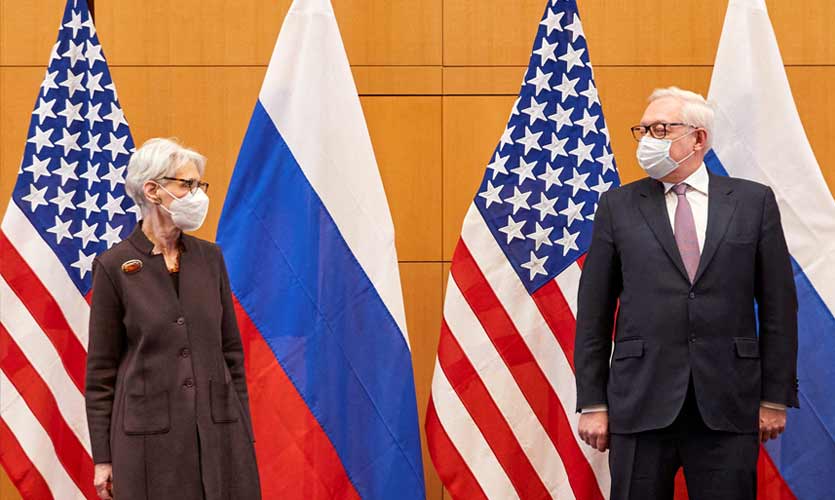The US and Russia wrapped up their seven hour-long meeting in Geneva to discuss the Ukraine conflict, late on January 10. The meeting ended in a deadlock after both countries failed to come to any agreement.
Russia has amassed 100,000 of its troops near the Ukrainian border presenting a constant threat to the country. The European Union and the US have raised fears that Russia could invade Ukraine. However, Russia has denied these allegations and demanded that its ex-Soviet ally (Ukraine) should not be granted a North Atlantic Treaty Organization (NATO) membership.
On Sunday, Russia had underscored that it would not make concessions under US pressure and warned that this week’s diplomatic talks over Ukraine could end early. The US reiterated that it does not expect any major breakthrough from these talks and that just de-escalation from Moscow could embolden the agenda for these talks and ease tensions.
“Unfortunately, we have a great disparity in our principled approaches to this. The US and Russia in some ways have opposite views on what needs to be done,” said Russian Deputy Foreign Minister Sergei Ryabkov during a news conference.
“We were firm… in pushing back on security proposals that are simply non-starters to the United States,” said US Deputy Secretary of State Wendy Sherman in a separate telephone briefing following nearly eight hours of talks with Ryabkov.
Ryabkov also stated that it was impossible for any progress to be made until or unless the US gives legal guarantees to Moscow that two of its ex-Soviet allies – Ukraine and Georgia – will never join NATO, and added that they are fed up with half promises. Reiterating Russia’s top demand, he added, “We do not trust the other side. We need ironclad, waterproof, bullet-proof, legally binding guarantees. Not assurances, not safeguards, guarantees with all the words ‘shall, must’, everything that should be put in, ‘never ever becoming a member of NATO’.”
On the other side, highlighting its support for Ukraine, the US repeated its stand that being an independent state it could make its own decisions to join an alliance (referring to NATO), and that it should not bend in front of Russia’s actions at the Russian-Ukrainian border.
The US has also warned Russia of sanctions if it attacks Ukraine. Meanwhile, Russia has warned the US to not “underestimate the risks” involved in Moscow’s confrontation with the West.
Washington and Kyiv say that Russia has amassed its 100,000 troops within striking distance of Ukraine and could be preparing a new invasion, eight years after Russia seized the Crimean Peninsula from Ukraine that further poisoned the relations between the two neighbours.
Hinting at the possibility of easing up tensions and mutual compromises, Sherman said that Washington was open to discussing missile deployments in Europe as well as limiting the size and scope of military exercises.
Ryabkov, however, reiterated Russia’s set of sweeping demands, including a ban on further NATO expansion and an end to its activity across central and eastern European countries that joined after 1997.
“For us it’s absolutely mandatory to make sure that Ukraine never, never, ever becomes a member of NATO,” he said, adding, “We do not trust the other side… It’s a matter of Russia’s national security,” he added.
“We will not allow anyone to slam closed NATO’s open-door policy,” Sherman told reporters. She said that the US “will not make decisions about Ukraine without Ukraine, about Europe without Europe, or about NATO without NATO”.
The meeting on Monday ended in a much-expected stalemate after Sherman specifically highlighted NATO’s “open-door policy” that extends to countries seeking entry in the alliance. This is said to have heated up the already soaring tensions between the US and Russia.
Read more: Kazakhstan: Over 160 Dead, 7939 Detained Amid Russian Crackdown Over Unrest
Monday’s meeting took place without the participation of the US’ European allies, including Ukraine. Sherman and other US officials, however, reassured that Ukraine, the EU and NATO allies would be included in any decisions that may be taken.
Earlier on Monday, EU foreign policy chief Josep Borrell Fontelles highlighted the extreme hostilities in the region, and underscored that “Russian invasion was still possible”. He said “There are 100,000 Russian troops on the other side of the border. I suppose they haven’t gone there to drink coffee!” Borrell also confirmed that he had been told nothing would be agreed on without the EU’s “strong cooperation, coordination and participation”.
Monday’s talks were part of the ‘Strategic Security Dialogue’ on arms control and other broad issues launched by Russian President Vladimir Putin and US President Joe Biden at a June summit. The next round of talks is planned for Wednesday in Brussels, followed by a meeting of the Organisation for Security and Cooperation in Europe on Thursday in Vienna.










